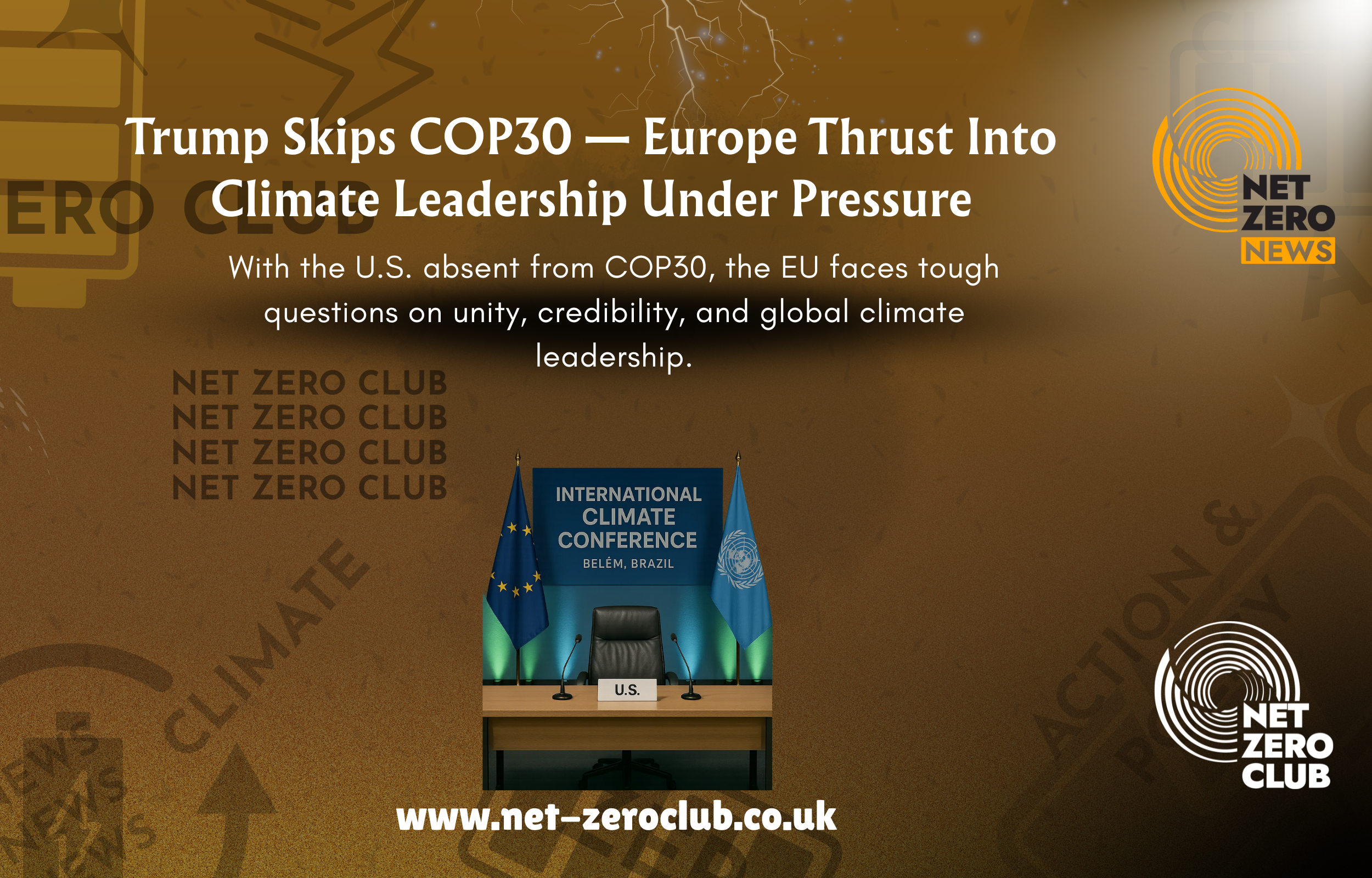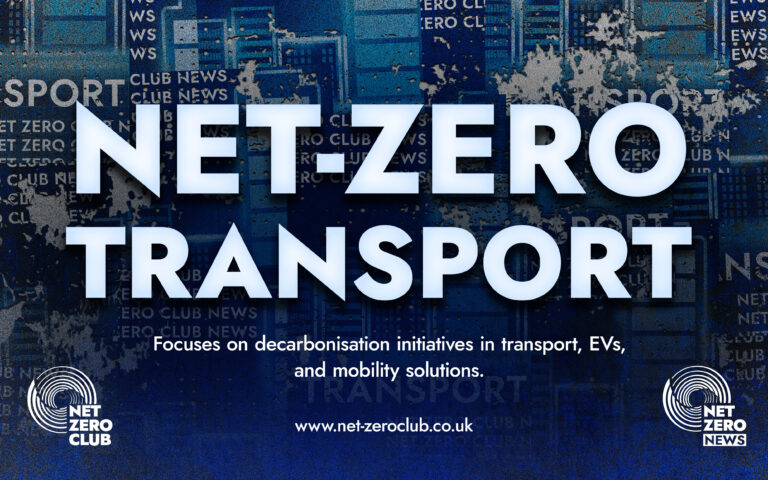Trump’s COP30 Snub Forces Unprepared Europe into Spotlight

Welcome, Net Zero News readers,
As the world gears up for the pivotal COP30 conference taking place in Brazil, a significant shift in global climate diplomacy is unfolding. Traditionally, the United States has played a crucial role as a stabilising force and primary powerbroker in climate discussions. However, with President Donald Trump’s unexpected decision to skip this year’s summit, the European Union finds itself in an unfamiliar and challenging position.
The absence of its long-time ally means that the 27-member bloc is now expected to absorb the pressures and demands typically directed at wealthy nations during these discussions. This situation presents the EU with a dual challenge: not only must it step into a leadership role, but it also must address mounting scepticism regarding its own domestic climate policies. With climate action increasingly under scrutiny at home and rising pressures from various factions, the EU arrives in Belém ill-prepared for the responsibilities that lie ahead.
The EU’s Leadership Challenge
Theoretically, the European Union is well-positioned to fill the leadership void left by the U.S., particularly given its ambitious climate targets and substantive policies. The EU has consistently championed progressive climate initiatives, aiming to set a high standard for global emissions reductions. Yet, the reality on the ground is complex. In recent years, the EU has faced growing internal challenges, including the rise of populist parties that question the efficacy of climate action and a struggling industrial sector that is increasingly resistant to stringent environmental regulations.
As the EU heads into COP30, its objectives are clear: to encourage other nations to enhance their climate commitments and to forge a united front in calling for more aggressive pollution reduction measures. This strategy seeks to highlight the stark contrast between the EU’s commitment to climate action and the regression of the U.S. under Trump’s administration, which has been marked by a revival of fossil fuel interests and a general retreat from international climate agreements.
However, this ambitious agenda is fraught with complications. The EU is already facing accusations of hypocrisy, particularly from major polluters like China and India, which complicates its ability to persuade these nations to strengthen their climate commitments at COP30.
A Fragile Position at COP30
EU climate officials maintain that their commitment to aggressive pollution cuts remains unwavering. Wopke Hoekstra, the European Commission’s climate chief, highlighted this resolve in a recent interview, stating, “We are doubling down on that leadership role.” However, the reality is that the EU’s ability to navigate the complexities of COP negotiations is severely hampered by its internal divisions and the absence of experienced political negotiators.
The EU’s task is further complicated by the fact that it no longer has the U.S. to act as a buffer against criticism from developing nations regarding the responsibilities of wealthy countries in the climate crisis. As a senior EU climate negotiator noted, “The Americans are no longer there to deflect attacks on the negotiation stance of rich countries,” placing the EU in a particularly uncomfortable position.
Moreover, the absence of key figures in the EU’s negotiating team, following a series of personnel changes within member states, has left the bloc vulnerable. Prominent negotiators who have previously guided the EU through past COPs are no longer in their roles, leading to concerns that the EU may struggle to effectively advocate for its climate agenda.
The China Factor
The dynamics of climate negotiations are also shifting as the EU grapples with the challenge posed by China, which has emerged as a significant player in global climate policy. In September, China announced targets to reduce its emissions by 7% to 10% by 2035, a move that was met with disappointment from EU officials who had anticipated a more ambitious commitment. The EU’s climate chief denounced the announcement as “clearly disappointing,” prompting a rebuke from Chinese officials who accused the EU of double standards.
The EU’s approach to China underscores the ongoing struggle to assert its leadership in climate negotiations without the backing of the U.S. Some EU negotiators argue that the bloc must learn to balance a dual role of both critic and collaborator with China, aiming to push for stronger commitments while also seeking to maintain a cooperative dialogue.
Amid these tensions, the EU’s inability to present a unified front on climate policy has raised concerns, particularly as the bloc missed a critical deadline for submitting new targets under the Paris Agreement. The EU’s proposed emissions cut of 66.3% to 72.5% below 1990 levels fell short of expectations, leading to further scrutiny regarding its credibility in the eyes of both allies and adversaries.
Internal Struggles and External Pressures
As the EU navigates the complexities of international climate negotiations, it must also contend with internal pressures that threaten to undermine its green agenda. Rising far-right political movements across the continent are increasingly vocal in their opposition to ambitious climate policies, arguing that such measures harm economic competitiveness and exacerbate energy insecurity.
In Belém, EU leaders must also address concerns from developing nations regarding climate financing and trade measures. Countries like India and Brazil are poised to challenge the EU’s commitment to equitable climate action, particularly in light of perceived inconsistencies in the bloc’s own policies.
Furthermore, the looming threat of trade tensions with China, exacerbated by the EU’s implementation of a carbon border adjustment mechanism (CBAM), complicates the bloc’s efforts to foster collaboration. This measure, designed to protect European industries from foreign competition that does not adhere to the same environmental standards, has been met with resistance from China and its allies, who view it as a protectionist tactic.
The Road Ahead
The road to COP30 is fraught with challenges for the European Union. As it grapples with the absence of the United States and the pressures of internal dissent, the bloc must strive to assert its leadership in global climate negotiations while also addressing the valid concerns of developing nations. The stakes are high, with the future of international climate action hanging in the balance.
In the coming days, as the EU faces scrutiny from all sides, it will be crucial for its leaders to present a united front that not only advocates for ambitious climate targets but also addresses the needs and concerns of all stakeholders involved. The success of COP30 may very well hinge on the EU’s ability to navigate these complexities and emerge as a credible leader in the fight against climate change.
As the conference unfolds, the world will be watching closely. Will the EU rise to the occasion and fill the leadership void left by the U.S., or will it falter under the weight of internal discord and external pressures? Only time will tell.

 Got net-zero news, project updates, or product launches to share?
Got net-zero news, project updates, or product launches to share? 



